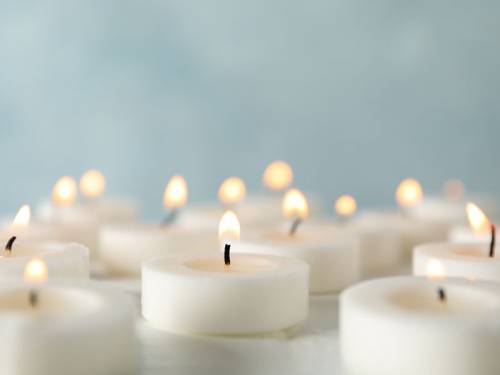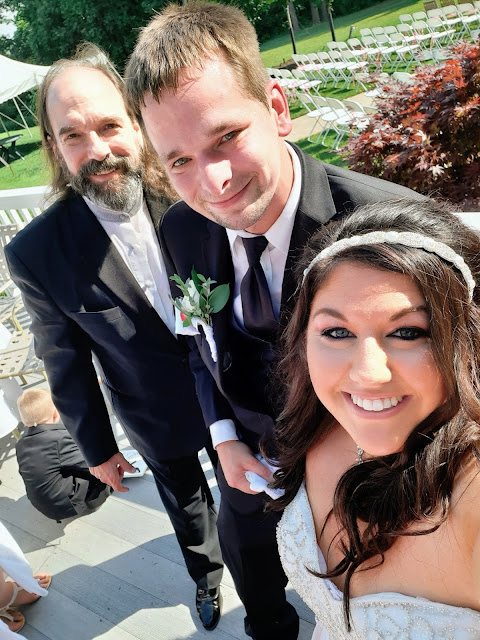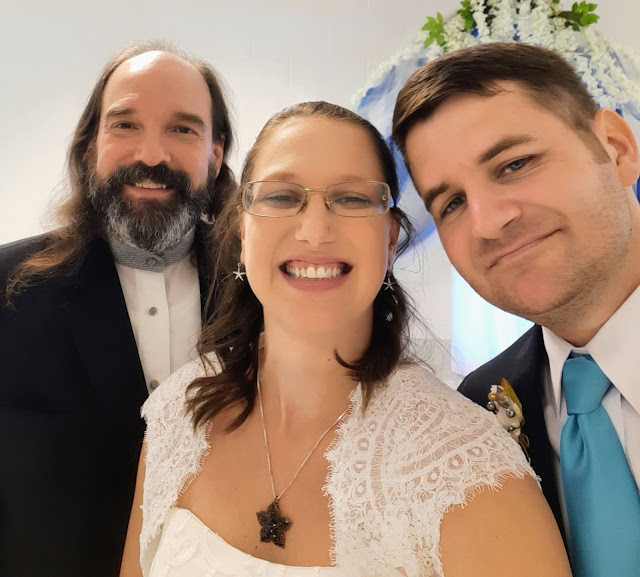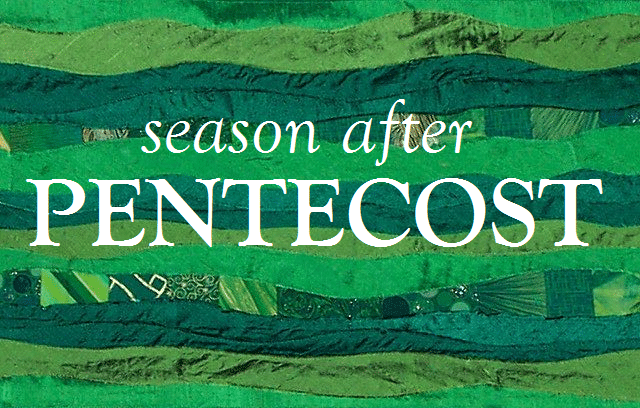On Friday, Saturday, June 26, I officiated the marriage of Brandon Hauck and Amber Scarber in Imperial, Pennsylvania. If you're planning your wedding and need an officiant, please give me a call at 304-479-3402.
Living the Christian life involves approaching God through prayer, praise and worship. On this site, we can find different ways people have and can enter into his presence.
Wednesday, June 30, 2021
The Wedding Service for Dave Disque and KaraLynn Ramsey on Saturday, June 26, 2021
On Friday, Saturday, June 26, I officiated the marriage of Dave Disque and KaraLynn Ramsey in Cheat Lake, West Virginia. If you're planning your wedding and need an officiant, please give me a call at 304-479-3402.
The Wedding Service for Jonathon Stevenson and Hailey Despoth on Friday, June 25, 2021
On Friday, June 25, I officiated the marriage of Jonathon Stevenson and Hailey Despoth in Medina. If you're planning your wedding and need an officiant, please give me a call at 304-479-3402.
The Lectionary Passages for Sunday, July 4, 2021 (6th Sunday after Pentecost)
2 Samuel 5:1-5, 9-10
Then all the tribes of Israel came to David at Hebron, and said, “Look, we are your bone and flesh. For some time, while Saul was king over us, it was you who led out Israel and brought it in. The Lord said to you: It is you who shall be shepherd of my people Israel, you who shall be ruler over Israel.” So all the elders of Israel came to the king at Hebron; and King David made a covenant with them at Hebron before the Lord, and they anointed David king over Israel. David was thirty years old when he began to reign, and he reigned forty years. At Hebron he reigned over Judah seven years and six months; and at Jerusalem he reigned over all Israel and Judah thirty-three years. David occupied the stronghold, and named it the city of David. David built the city all around from the Millo inwards. And David became greater and greater, for the Lord, the God of hosts, was with him.
Ezekiel 2:1-5
He said to me: O mortal, stand up on your feet, and I will speak with you. And when he spoke to me, a spirit entered into me and set me on my feet; and I heard him speaking to me. He said to me, Mortal, I am sending you to the people of Israel, to a nation of rebels who have rebelled against me; they and their ancestors have transgressed against me to this very day. The descendants are impudent and stubborn. I am sending you to them, and you shall say to them, “Thus says the Lord God.” Whether they hear or refuse to hear (for they are a rebellious house), they shall know that there has been a prophet among them.
Great is the Lord and greatly to be praised in the city of our God. His holy mountain,
beautiful in elevation, is the joy of all the earth, Mount Zion, in the far north, the city of the great King.
Within its citadels God has shown himself a sure defense.
Then the kings assembled, they came on together.
As soon as they saw it, they were astounded; they were in panic, they took to flight;
trembling took hold of them there, pains as of a woman in labor,
as when an east wind shatters the ships of Tarshish.
As we have heard, so have we seen in the city of the Lord of hosts, in the city of our God, which God establishes forever. Selah
We ponder your steadfast love, O God, in the midst of your temple.
Your name, O God, like your praise, reaches to the ends of the earth. Your right hand is filled with victory.
Let Mount Zion be glad, let the towns of Judah rejoice because of your judgments.
Walk about Zion, go all around it, count its towers,
consider well its ramparts; go through its citadels, that you may tell the next generation
that this is God, our God forever and ever. He will be our guide forever.
Psalm 123
To you I lift up my eyes, O you who are enthroned in the heavens!
As the eyes of servants look to the hand of their master, as the eyes of a maid to the hand of her mistress, so our eyes look to the Lord our God, until he has mercy upon us.
Have mercy upon us, O Lord, have mercy upon us, for we have had more than enough of contempt.
Our soul has had more than its fill of the scorn of those who are at ease, of the contempt of the proud.
2 Corinthians 12:2-10
I know a person in Christ who fourteen years ago was caught up to the third heaven—whether in the body or out of the body I do not know; God knows. And I know that such a person—whether in the body or out of the body I do not know; God knows— was caught up into Paradise and heard things that are not to be told, that no mortal is permitted to repeat. On behalf of such a one I will boast, but on my own behalf I will not boast, except of my weaknesses. But if I wish to boast, I will not be a fool, for I will be speaking the truth. But I refrain from it, so that no one may think better of me than what is seen in me or heard from me, even considering the exceptional character of the revelations. Therefore, to keep me from being too elated, a thorn was given me in the flesh, a messenger of Satan to torment me, to keep me from being too elated. Three times I appealed to the Lord about this, that it would leave me, but he said to me, “My grace is sufficient for you, for power is made perfect in weakness.” So, I will boast all the more gladly of my weaknesses, so that the power of Christ may dwell in me. Therefore I am content with weaknesses, insults, hardships, persecutions, and calamities for the sake of Christ; for whenever I am weak, then I am strong.
Mark 6:1-13
He left that place and came to his hometown, and his disciples followed him. On the sabbath he began to teach in the synagogue, and many who heard him were astounded. They said, “Where did this man get all this? What is this wisdom that has been given to him? What deeds of power are being done by his hands! Is not this the carpenter, the son of Mary and brother of James and Joses and Judas and Simon, and are not his sisters here with us?” And they took offense at him. Then Jesus said to them, “Prophets are not without honor, except in their hometown, and among their own kin, and in their own house.” And he could do no deed of power there, except that he laid his hands on a few sick people and cured them. And he was amazed at their unbelief.
Then he went about among the villages teaching. He called the twelve and began to send them out two by two, and gave them authority over the unclean spirits. He ordered them to take nothing for their journey except a staff; no bread, no bag, no money in their belts; but to wear sandals and not to put on two tunics. He said to them, “Wherever you enter a house, stay there until you leave the place. If any place will not welcome you and they refuse to hear you, as you leave, shake off the dust that is on your feet as a testimony against them.” So they went out and proclaimed that all should repent. They cast out many demons, and anointed with oil many who were sick and cured them.
Prayers for Our Community, Our Nation and Our World
We can offer specific daily prayers for our community, nation and world. Between Monday, July 5 and Sunday, July 11, we'll lay before God the needs listed below.
- Monday - That our city, state and national leaders would be presented with the Gospel and a loving Christian witness.
- Tuesday - That we listen to those who have experiences difference than our own.
- Wednesday - That our judges and Supreme Curt justices would adjudicate with godly wisdom.
- Thursday - That teachers and administrators would be open to God's Word and God's will.
- Friday - That those in the entertainment industry recognize any negative influences within their media creations.
- Saturday - That those in the media and government would report facts accurately and without any bias.
- Sunday - That Americans determine to approach our differences with both faith and commonsense
A Thought from the Word
Tuesday, June 29, 2021
Looking into the lectionary — 2 Corinthians & leadership
| ||||||||||||||||||||||||||||||||||||||
|
WCC NEWS: Patriarch of Antioch and All the East affirms “closeness in prayer” with WCC central committee
| ||||||||||||||||||||||||||
|
Friday, June 25, 2021
The role of ritual in pandemic recovery
A liturgy for healing and moving forward
By Tracy Mehr-Muska | Presbyterians Today
 Clinical chaplaincy had been my passion and the bulk of my life’s work until I recently followed a call to parish ministry at Asylum Hill Congregational Church in Hartford, Connecticut. In 2020, a few weeks into my new ministry, our state went into quarantine due to the coronavirus pandemic. We quickly realized that the pandemic was going to upend everything we knew about ministry, the church and our community. Unlike any other time in the church’s recent past, there was not just a small number of individuals or families dealing with crisis at a given moment. Instead, nearly all the members of our community were simultaneously facing uncertainty, fear, danger and momentous emotional, financial and spiritual disruption.
Clinical chaplaincy had been my passion and the bulk of my life’s work until I recently followed a call to parish ministry at Asylum Hill Congregational Church in Hartford, Connecticut. In 2020, a few weeks into my new ministry, our state went into quarantine due to the coronavirus pandemic. We quickly realized that the pandemic was going to upend everything we knew about ministry, the church and our community. Unlike any other time in the church’s recent past, there was not just a small number of individuals or families dealing with crisis at a given moment. Instead, nearly all the members of our community were simultaneously facing uncertainty, fear, danger and momentous emotional, financial and spiritual disruption.
I found myself serving in the role of chaplain yet again, and many other church leaders are likely doing the same. In this context, some of the practices and principles of chaplaincy can be employed to help us cope and move forward: invite the telling of our stories; create space to name and grieve the changes, transitions and losses that we experience; and develop meaningful rituals that acknowledge these sources of fatigue and grief.
We now find ourselves emerging from this pandemic time, and this undertaking is proving to be far more complicated and perhaps even more consequential than the task of going into pandemic time.
Creating spaces to name and grieve the changes, transitions and losses that have become parts of our story is essential. Whether we have floundered or thrived during this past year, we have all experienced unexpected and often unwanted changes and change. Even change for the better always involves loss. As we name these changes, grieve these losses and acknowledge our fatigue, may we also identify and honor the resilience, problem-solving skills, perseverance, faithfulness and creativity that have been required of us this year. These traits that the pandemic has helped hone will be essential going forward.
We now face a moment of transition that offers the once-in-a-lifetime invitation to assess what we have learned, to acknowledge what we have lost and to fundamentally revolutionize how we define ourselves and how the church does its work in our communities and the world. To move into a new phase of being, it is important that we collectively take time to acknowledge our fatigue and grief and remind ourselves of God’s companionship, guidance and faithfulness. Religious ritual can offer the sacred and holy space of solidarity in which to do this. Religious ritual can allow us to let go of the past and mindfully move into the future, preparing us to chart new courses with intention, purpose and hope.
We have been given an extraordinary opportunity to live into a radically new chapter of the church that is more accessible, inclusive, authentic, focused and sustainable. In a way, we are being born again. At this precipice of opportunity, may we discover strength in our storytelling, peace in the acknowledgment of our grief and suffering, and solidarity and hope in the ritualizing of this transition from pandemic time to a world of post-pandemic possibility.
Tracy Mehr-Muska is the minister of mid and later life at Asylum Hill Congregational Church in Hartford, Connecticut. She is an ordained PC(USA) pastor, board-certified chaplain and author of “Weathering the Storm: Simple Strategies for Being Peaceful and Prepared.”
A Liturgy for Moving Forward
[During the silence between readings, the worship leader lights the candle.]
The following is a service for healing and moving forward to be used as congregations reunite.
Worship leader: We have each been affected by this pandemic in different ways. Let us now take an opportunity to name and grieve the emotional, physical and spiritual toll this past year has taken, not for the purpose of moving backward or dwelling on the pain, but instead for the purpose of being honest and authentic with ourselves and one another. I pray that in acknowledging and grieving our losses, we might create room in our hearts for hope, creativity, joy and ingenuity. As we light these six candles, may we recognize our companionship in our sadness, find comfort in our solidarity and feel empowered to live into this next chapter with faith and hope.
Candle 1 — Physical Losses
A Reading from Psalm 69
Save me, O God, for the waters have come up to my neck. I sink in the miry depths, where there is no foothold. I have come into the deep waters; the floods engulf me. I am worn out calling for help; my throat is parched. My eyes fail, looking for my God.
Worship leader: We are worn out calling for help after experiencing vast physical losses. Nearly 600,000 Americans and over three million people worldwide have died of COVID-19. Numerous others have survived but are dealing with the lingering side effects. We also recognize the exhaustion of our essential workers, who have spent extra hours and sleepless nights caring and protecting us. We also recognize those living with disabilities, older adults and those in socially- and financially-disadvantaged communities for whom life has been more difficult and access has been less available. In this time of silence, I invite us to name, aloud or silently, the physical losses we have experienced.
Candle 2 — Emotional Losses
A Reading from Psalm 6
Have mercy on me, Lord, for I am faint; heal me, Lord, for my bones are in agony. My soul is in deep anguish. How long, Lord, how long?
Worship leader: How long, O Lord? How long can those with mental health challenges and substance use disorders remain disconnected from the sources of support and recovery? How long can we live under the stress of uncertainty, anxiety and fear? How long, O Lord? In this time of silence, I invite us to name, aloud or silently, the losses we have experienced related to our emotional well-being and sense of balance.
Candle 3 — Spiritual Losses
A Reading from Psalm 13
How long, Lord? Will you forget me forever?
How long will you hide your face from me?
How long must I wrestle with my thoughts
and day after day have sorrow in my heart?
Worship leader: For some of us, God has felt absent. Away from our community of faith, our Christian sharing groups, our hymn singing and our holiday rituals, we feel adrift and long for spiritual centeredness. Other sources of spiritual nourishment, too, are deeply missed as we feel disconnected from cultural and social enrichment that stirred in us a sense of wonder and awe. In this time of silence, I invite us to name, aloud or silently, the losses we have experienced related to our spiritual centeredness, our connections with our faith community and our relationships with God.
Candle 4 — Financial Losses
A Reading from Psalm 130
Out of the depths I cry to you, Lord;
Lord, hear my voice. Let your ears be attentive to my cry for mercy.
Worship leader: We ask for mercy as we see the ongoing impact of this pandemic on small businesses. We ask for mercy for those who have been let go from their jobs and those whose hours have been cut. We ask for mercy for those who have not been able to find work and for those dedicated parents who are exhausted from trying to maintain their professional obligations while parenting. We ask for mercy for all those dealing with housing and food insecurity. Hear our voices, O God. In this time of silence, I invite us to name, aloud or silently, the losses we have experienced related to our financial stability, our professional identity or our professional aspirations.
Candle 5 — Interpersonal Losses
A Reading from Psalm 25
Turn to me and be gracious to me, for I am lonely and afflicted. Relieve the troubles of my heart and free me from my anguish.
Worship leader: Family gatherings, graduations, weddings, funerals, visits with friends — we have missed it all. We grieve the disruption to sporting events, family visits, annual trips or vacations, and even the too long, but wonderful, youth recitals. And for those who experience domestic, physical or emotional abuse or hostility, these months of quarantine have been suffocating and dangerous. In this time of silence, I invite us to name, aloud or silently, the interpersonal and relational losses we have experienced.
Candle 6 — Hidden Blessings
A Reading from Psalm 30
Lord my God, I called to you for help,
and you healed me. You, Lord, brought me up from the realm of the dead;
you spared me from going down to the pit.
Weeping may stay for the night, but rejoicing comes in the morning. You turned my wailing into dancing; you removed my sackcloth and clothed me with joy.
Worship leader: We trust that rejoicing does come in the morning, and that our God of power and might can turn wailing into dancing, clothing us with joy. As we light our final candle, I invite us to consider those hidden blessings — those new discoveries and practices we hope to bring with us post-pandemic, the ways we have grown and those things we have learned. In this time of silence, I invite us to name, aloud or silently, the ways in which we have grown or the new awareness and appreciation we have discovered.
Closing Prayer
God of grace, you know the suffering we have experienced is real. Losses that we have suffered amplify past losses and compound into feelings, which at times are almost too much to bear. We are weary; so help us, dearest Lord, to grieve, to grow, to let go, to heal and recover. Help us to remember these losses so that we might begin anew with a deeper sense of awe, appreciation, wisdom and perspective. In Jesus’ name we pray, Amen.
— Tracy Mehr-Muska
Looking into the lectionary - Your worship companion for May 5
Churches, Denominations and Religions: Looking into the lectionary - Your worship compani... : May 5, 2024 Sixth Sunday of Easter John 15:9-...

-
Here's a new devotion that I wrote. You can find a recording of this devotion at the bottom of the page. Romans 1:16-25 For I am not...
-
Connecting during social distancing: This week's resources for worship, study and navigating COVID-19 : Presbyterian Outlook COVID-19 ...
-
Here's a new devotion that I wrote. You can find a recording of this devotion at the bottom of the page. Galatians 3:1-5 You foolish G...

















